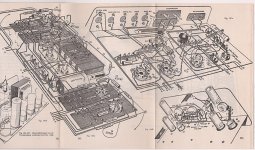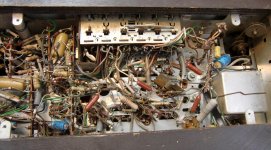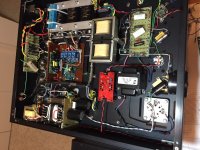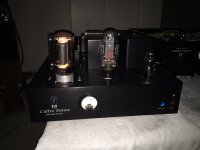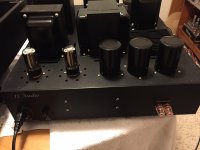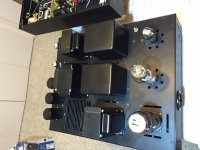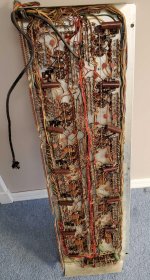JoeAlders,
What were the years of your manuals that did not live up to that standard?
What were the years of your kits that did not recommend that the wires be wrapped around the terminal or eyelet hole?
Was there never an "old standard"?
Perhaps I am not understanding what you said.
I also remember wiring up Harmon Kardon kits, and Dyna kits.
Same good manuals and techniques.
I know . . .
"Standards are such a wonderful thing that everyone has his own" - Me
I am still waiting for my next car to have 17.5 inch wheels.
So much for standards.
After reading your response with all those questions I got the unpleasant feeling to have in some way offended you?
If so, I immediately apologize.
"What were the years of your manuals that did not live up to that standard?"
Do not what you mean here. sorry.
"What were the years of your kits that did not recommend that the wires be wrapped around the terminal or eyelet hole?"
Those years where the mid 60's of the past century and
I cannot remember to have received such recommendations. Only a slight hook of the wire was recommended before soldering them to a terminal.
See the attached drawing of a 10W Triode PP amp.
"Was there never an "old standard"?
Perhaps I am not understanding what you said."
No you did not understand what I meant or let me say I did not express myself correctly. I never wrote "old standard" but "old school".
Al least over here this has to be interpreted as slightly inferior with respect to how it done nowadays. Some young man once said to me:
"analogue electronics? That is old school! Everything is better using digital technique."
getting back to the thread starters "point to point".
In my view you have "point to point" giving you a clean view of the design see the other attached picture and,
in my view "spaghetti" point to point is as the one I faced a view years ago when I had to repair a Philips radio.
That is all. Nothing more to say.
Attachments
I don't know if there ever was a standard of "wire wrap before solder" joints.
We have learned to do it that way at the "Deutsche Bundespost Fernmeldewesen" when being educated for a job. This took three and a half years, and this was the usual education time in germany before doing a job. I don't think that such a system have ever existed in the US. It combined schooling in theory and practice training in the company, which pays the sallary in this time. Just to receive perfectly trained people afterwards.
I have read here before the sentence "labour of love", but when seeing those spaghetti wiring and solder glueing, PCB (computer technology) gear inside, for me this misses exactly this aspect..LOVE. All this gear has been done just loveless.
No striving for perfection in details, just amateur made (and therefore without the knowledge of how to do it better and do it to standards), fast execution without real planning. And in the end- that's what it will sound like.
PCB boards always sounding thin and two dimensional. Solder used as glue connections sound muddy and with less resolution compared to "wire wrap before soldering" connections. Just because solder is such a bad conductor. And spaghetti wiring always produces a mess to the signals. Nothing is under control, no plan, amateur execution.
And thats exactly why I switched to DIY. I was so bored to listen and finding PCB's (even in the expensive gear). I was so bored to listen to badly executed gear. So bored to see the second best technical solution being choosen, even in the most expensive gear. I don't know whats the reason for other people for DIY, but I'm glad that not for one second I had to listen to such gear any longer. Because I know how bad it sounds, how second and third rate the outcome is. And how much better one can achieve if being done with passion, with knowledge of "how to" and with the love for the details in the practical workmanship.
We have learned to do it that way at the "Deutsche Bundespost Fernmeldewesen" when being educated for a job. This took three and a half years, and this was the usual education time in germany before doing a job. I don't think that such a system have ever existed in the US. It combined schooling in theory and practice training in the company, which pays the sallary in this time. Just to receive perfectly trained people afterwards.
I have read here before the sentence "labour of love", but when seeing those spaghetti wiring and solder glueing, PCB (computer technology) gear inside, for me this misses exactly this aspect..LOVE. All this gear has been done just loveless.
No striving for perfection in details, just amateur made (and therefore without the knowledge of how to do it better and do it to standards), fast execution without real planning. And in the end- that's what it will sound like.
PCB boards always sounding thin and two dimensional. Solder used as glue connections sound muddy and with less resolution compared to "wire wrap before soldering" connections. Just because solder is such a bad conductor. And spaghetti wiring always produces a mess to the signals. Nothing is under control, no plan, amateur execution.
And thats exactly why I switched to DIY. I was so bored to listen and finding PCB's (even in the expensive gear). I was so bored to listen to badly executed gear. So bored to see the second best technical solution being choosen, even in the most expensive gear. I don't know whats the reason for other people for DIY, but I'm glad that not for one second I had to listen to such gear any longer. Because I know how bad it sounds, how second and third rate the outcome is. And how much better one can achieve if being done with passion, with knowledge of "how to" and with the love for the details in the practical workmanship.
Last edited:
To each their own I guess... Personally, I think your comments about PCBs are ridiculous. Clearly we are all amateurs compared to you, Schmitz. 
I'm still waiting for you to post a picture of something you designed and built yourself. I suspect I'll continue to wait for an indefinite period of time for that.
I'm still waiting for you to post a picture of something you designed and built yourself. I suspect I'll continue to wait for an indefinite period of time for that.
Real point to point is just that IMHO. No circuit board or turret strips.
Here's a bass/treble control...
You certainly made your point. That is borderline gruesome.
G²
I have posted those pics already. Maybe your too late or too lazy to being aware of this. And I've stated that I'm no master in the discipline of amp building. I've found my masters and try my best.To each their own I guess... Personally, I think your comments about PCBs are ridiculous. Clearly we are all amateurs compared to you, Schmitz.
I'm still waiting for you to post a picture of something you designed and built yourself. I suspect I'll continue to wait for an indefinite period of time for that.
Its not that anybody else couldn't do this, but it has a lot to do with a love for details, which many others seem not to have or simply not know how to do better. Not my problem anyway, everyone should build what he thinks is good enough for him/ her.
You should recognize them by their deeds!
(1. Johannes 2,1-6)
Last edited:
....
in my view "spaghetti" point to point is as the one I faced a view years ago when I had to repair a Philips radio.
That is all. Nothing more to say.
Philips consumer is a total different animal from Philips telephone exchanges that I had to put together. You know what they say about accountants running the show but that did not work with telecoms.
Philips consumer is a total different animal from Philips telephone exchanges that I had to put together. You know what they say about accountants running the show but that did not work with telecoms.
You probably are right here.
I did not know that Philips, apart from their PBX products, also made tel. exchanges for the industry.
Philips consumer electronics in the post- war years until 1980's were high quality build and lasted very long. We had Philips black and white in the 1960s TV set and in 1970 our first color TV set by Philips. Those gear had to run everyday many hours. Every Philips TV packed thousands of near trouble free workload on their account over a time of at least ten years.Philips consumer is a total different animal from Philips telephone exchanges that I had to put together. You know what they say about accountants running the show but that did not work with telecoms.
No one can say that this has been a company where penny pinchers ruled, I think the engineers ruled at those times. The same was with Mercedes Benz until the mid 1980s. They designed and engineered their products and afterwards the bill was written, some profit margin was added and that gave the end result for the customer to pay. Customers paid gladly, because they knew they will receive quality in return. That whole business model was eaten by the asians which flooded the markets worldwide with their cheap low budget stuff. Mercedes has eaten themself with their shitty plastic cars and they will go bankrupt soon.
Last edited:
Philips consumer electronics in the post- war years until 1980's were high quality build and lasted very long. We had Philips black and white in the 1960s TV set and in 1970 our first color TV set by Philips. Those gear had to run everyday many hours. Every Philips TV packed thousands of near trouble free workload on their account over a time of at least ten years.
No one can say that this has been a company where penny pinchers ruled, I think the engineers ruled at those times. The same was with Mercedes Benz until the mid 1980s. They designed and engineered their products and afterwards the bill was written, some profit margin was added and that gave the end result for the customer to pay. Customers paid gladly, because they knew they will receive quality in return. That whole business model was eaten by the asians which flooded the markets worldwide with their cheap low budget stuff. Mercedes has eaten themself with their shitty plastic cars and they will go bankrupt soon.
I know......, I was one of them.......
But by the mid and the end of the 20th century and the start of the 21st century we also sold our I.C.'s to almost all asian TV-set makers. Our company was very successful in those years. Then Philips sold the Nijmegen plant which designed and produced these successful I.C.'s, to my regret (luckily after I retired in 2006). It is now NXP.
How it started and how it's now. My SET 300B.
In between many different configurations and components. Sounding perfect for me and deadly quiet and no noise at all.
It was quite a journey and still learning.
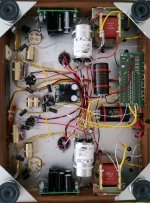
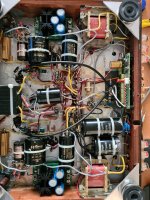
View attachment 896474
In between many different configurations and components. Sounding perfect for me and deadly quiet and no noise at all.
It was quite a journey and still learning.


View attachment 896474
...because they are able to produce a tone quality, no modern capacitor can. And thats what musicians are hearing and paying for.
Unfortunately, they tend to fail over time because of their paper dielectric become defective or humid.
But you can't copy the original Hendrix sound with modern components. Absolutely impossible. Its like trying to paint Mona Lisa with modern colors.
And most musicians know that. Most audiofools don't know that. Because they don't care, they prefer to talk about their new equipment rather than really hearing the difference. Mostly they are proud of what they are being able to purchase. If you look inside, poor parts quality. But because they have purchased it, it must be good, better and the best. "Look at this brand new amp. Because I purchased it, this must be excellent." Sorry pal, it mustn't and it isn't. The really first rate gear is what you are unable to locate and pay for. So much about the Bumblebee theme.
Unfortunately, they tend to fail over time because of their paper dielectric become defective or humid.
But you can't copy the original Hendrix sound with modern components. Absolutely impossible. Its like trying to paint Mona Lisa with modern colors.
And most musicians know that. Most audiofools don't know that. Because they don't care, they prefer to talk about their new equipment rather than really hearing the difference. Mostly they are proud of what they are being able to purchase. If you look inside, poor parts quality. But because they have purchased it, it must be good, better and the best. "Look at this brand new amp. Because I purchased it, this must be excellent." Sorry pal, it mustn't and it isn't. The really first rate gear is what you are unable to locate and pay for. So much about the Bumblebee theme.
Last edited:
The same was with Mercedes Benz until the mid 1980s. They designed and engineered their products and afterwards the bill was written, some profit margin was added and that gave the end result for the customer to pay. Customers paid gladly, because they knew they will receive quality in return. That whole business model was eaten by the asians which flooded the markets worldwide with their cheap low budget stuff. Mercedes has eaten themself with their shitty plastic cars and they will go bankrupt soon.
There was me thinking it was something to do with the take over by Chrysler, and moving production to the States.
Yeah, those bumble bees and other wax paper capacitors. They've soaked water from the humid air and totally grown out of specs during the decades. Same holds for carbon comp resistors which are also being hyped especially by musicians. Their actual resistances often are waaay beyond the factory tolerances. Did the musicians play their certain amplifiers when they were brand new, with all cvomponents being well in their specs, and listen to their brand new sound? I bet they didn't. Hence it's all about an aquired taste.
Finally, what's this got to do with PTP wiring at all? I bet no one can reliably discern between PTP and PCB wiring just by his ears.
Regarding Mercedes: Yes, that Daimler Chrysler Connection surely wasn't the most lucky one. Hence it needed to be shut down years ago. If MB would ever go bankrupt, which I'm in doubt of, the reason has to been found elsewhere (too big cars, especially SUV's, too big engines, too high fuel consumption).
Best regards!
Finally, what's this got to do with PTP wiring at all? I bet no one can reliably discern between PTP and PCB wiring just by his ears.
Regarding Mercedes: Yes, that Daimler Chrysler Connection surely wasn't the most lucky one. Hence it needed to be shut down years ago. If MB would ever go bankrupt, which I'm in doubt of, the reason has to been found elsewhere (too big cars, especially SUV's, too big engines, too high fuel consumption).
Best regards!
Last edited:
- Home
- Amplifiers
- Tubes / Valves
- Point to point wiring
